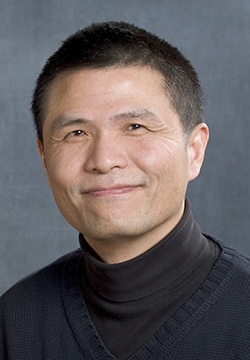Shu Chi-wang


Professor Shu Chi-wang
Honorary University Fellow (2021)
The first college entrance examination in 1977 after 10 years of the Cultural Revolution, a period of political and social chaos, changed the lives of thousands of students in mainland China, including Professor Shu Chi-wang.
Before that, while it was not possible for Professor Shu to enter any college, he spent time studying whatever interested him, including mathematics. He just followed his heart, did what he liked, and hoped for the best. Life was tough and frustrating, but he never let the wear and tear of the day or the years tie him down.
Having passed the college entrance examination with flying colours, Professor Shu was admitted to the University of Science and Technology of China, and he graduated with a bachelor’s degree in Mathematics in 1982. He then went to the University of California at Los Angeles in the United States to further his studies, and he was awarded a PhD in 1986. After a year as a postdoc fellow at the University of Minnesota, he joined Brown University as an Assistant Professor in 1987, moving up to Associate Professor in 1992 and Full Professor in 1996. He is now the Theodore B. Stowell University Professor of Applied Mathematics at the institution, and Professor Shu is the first student from mainland China after its opening up to be appointed as a head of a mathematics department at a world-renowned university in the United States.
Professor Shu’s work over the past three and a half decades has had a major impact on scientific computing and numerical analysis. His contributions have been widely recognised and acknowledged in numerous ways, and he received the NASA Public Service Group Achievement Award in 1992 for his pioneering work in computational fluid dynamics, the first Feng Kang Prize of Scientific Computing from the Chinese Academy of Sciences in 1995, and the Society for Industrial and Applied Mathematics (SIAM)/Association of Computing Machinery (ACM) Prize in Computational Science and Engineering in 2007. In addition, he was elected as a member of the inaugural class of Fellows of SIAM in 2009 and the American Mathematical Society (AMS) in 2012, and this year, he was awarded the John von Neumann Prize, which is the highest honour of SIAM.
Professor Shu is the Chief Editor of the Journal of Scientific Computing and a key member of the editorial boards of many important publications. Since 2004, Professor Shu has been listed as an ISI Highly Cited Author in Mathematics by the ISI Web of Knowledge, and Google Scholar lists over 70,000 citations to his publications.
Professor Shu has also made tremendous contributions to the scientific community by mentoring and supporting junior researchers, including his PhD students, postdocs, visiting scholars, collaborators and colleagues, and even participants of his numerous summer school lectures. In addition, he has played an instrumental role in advancing the number of women in the mathematical sciences. Over the years, he has supervised more than 20 female mathematicians’ PhDs, bringing them into the world of research and nurturing their professional success. In recognition of his efforts, he was elected as a Fellow of the Association for Women in Mathematics (AWM) in 2019.
A very committed mentor, Professor Shu assures his students that they are his priority. He encourages his students to drop by his office at any time without making an appointment, and he always stops whatever he is doing to talk to them. In fact, it’s fair to say that he not only opens their minds, but he also touches their hearts. In a special issue of the Journal of Scientific Computing, which was published in honour of Professor Shu on the occasion of his sixtieth birthday in 2017, many of his mentees shared their heartfelt gratitude towards him. “You have been a mentor, a role model and an inspiration, and I am fortunate to be your student”, “Thank you for enlightening my career and my life”, “You are the wisest and nicest man that I have ever met”. To Professor Shu, these words might be more rewarding than the many honours and awards he has received.
Professor Shu is committed to nurturing future mathematicians, and he encourages young researchers to follow their hearts, pursue their interests, and work hard in their chosen areas. Never get discouraged despite difficulties or drawbacks, as he claimed, and this philosophy has probably led to his success in academia.